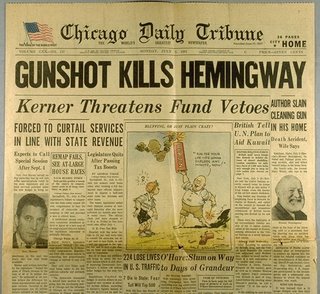
Starting back in August 2005, I've gotten through For Whom the Bell Tolls, The Sun Also Rises and A Farewell to Arms. And I was ready for a break from Hemingway, but this book looked to be something different.
And it was. His son (Patrick) actually edited this for publication 35 years after Hemingway's death. It is based on experiences on safari near Nairobi in 1953. I think the manuscripts (which
 were extricated along with other unpublished stuff from Cuba in exchange for Hemingway's real estate) needed a lot of work, and the book is uneven. But I ended up really liking it. The book is pretty much autobiographical, though fictional. It being 1953, the old-style safari and colonial days are done for. The protagonist oscillates between his American and European mores and the African lifestyle that he seems to really enjoy. His wife kills a huge lion, using her mediocre hunting skills. He likes a native girl. They hunt and drink and talk and fly in airplanes. It's good.
were extricated along with other unpublished stuff from Cuba in exchange for Hemingway's real estate) needed a lot of work, and the book is uneven. But I ended up really liking it. The book is pretty much autobiographical, though fictional. It being 1953, the old-style safari and colonial days are done for. The protagonist oscillates between his American and European mores and the African lifestyle that he seems to really enjoy. His wife kills a huge lion, using her mediocre hunting skills. He likes a native girl. They hunt and drink and talk and fly in airplanes. It's good.Hemingway had quite the interesting life, summarized here. Injured while driving an ambulance in Italy during WW I (A Farewell to Arms gets into this). Hung out in Paris in some expatriate group after the war (The Sun Also Rises gets into this). Spent time in Spain around the time of
 the Civil War (For Whom the Bell Tolls gets into this). And all sorts of other things before shooting himself in the head. Of those three novels, I thought For Whom the Bell Tolls was definitely the best.
the Civil War (For Whom the Bell Tolls gets into this). And all sorts of other things before shooting himself in the head. Of those three novels, I thought For Whom the Bell Tolls was definitely the best.Also read this at the gym. (It's amazing how many pages you can cover during 30 minutes every other day on a stairmaster.)


